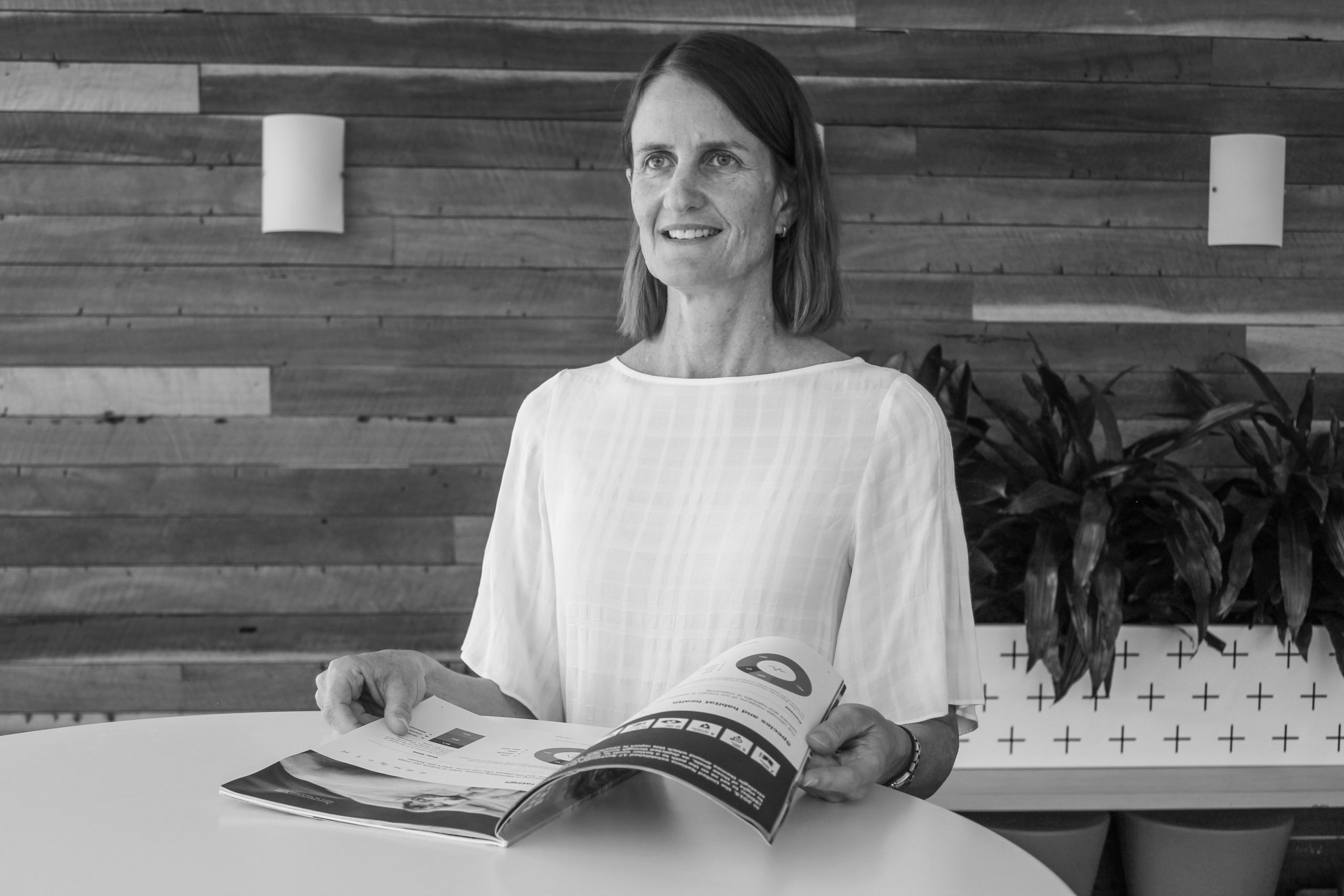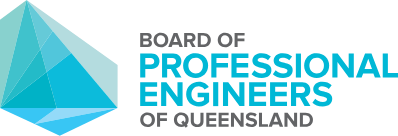06 Feb BPEQ 90th Anniversary: Celebrating Cathie Barton
In 2020, BPEQ turns 90. To celebrate this milestone BPEQ is acknowledging the achievements, projects, innovations, discoveries and stories of RPEQs past and present.
RPEQ Cathie Barton’s colleagues view her as a role model; someone who does their best to support and guide her
peers without expecting plaudit. Cathie is the team leader of BMT’s Brisbane flood team and a technical leader in her own right. While she is an ‘unsung hero’, she has had a positive and lasting effect on those that work with her.
Cathie spoke with BPEQ about her career, her achievements and challenges. What attracted you to a career in engineering?
I really enjoyed maths and science at school and thought I would enjoy a career that combined the two in a practical way. I didn’t know any real-life engineers and had a limited understanding about what engineering actually was, so it was a bit of a leap into the unknown. As my career progressed, I found myself just as engaged by the ‘people’ aspects of the role as the technical challenges. Certainly not something I considered as a young graduate!

“It was a dream job…”
First job in engineering?
My first job after graduation was in the Coastal Protection Unit of the old Queensland Department of Environment and Heritage. This was a dream job for a surfing-obsessed graduate from northern NSW!
What were the challenges you faced during study or in the early stages of your career?
The freedom of university life causing a drop in grades compared to school! There were also a few challenges associated with being a woman in an extremely male-dominated industry (and even more so when I first started), but I was lucky that this did not impact on my career. As an undergraduate, I did a water resources placement in a very small regional town. During my six-week stint, I only once met the sole engineer in the office – I later found out that he had announced he wasn’t going to “waste time with a girl”! Luckily the rest of the office were much more supportive and took me under their wings. I had a great experience and learned a huge amount despite the engineer’s attitude.
“…a women in an extremely male-dominated industry…”
Your peers have spoken about the work you do to support young engineers. Did you have a mentor when you started out in engineering? How did they help you?
I didn’t have a formal mentor but I did work with a bunch of good people who were passionate about the work they did and supportive of the development of others. Although I’m not part of a formal mentoring program at present, BMT has a great team culture of supporting and guiding each other. Importantly, that support isn’t one-directional with just seniors mentoring juniors; there is a real matrix of support from all directions. I am constantly learning from everyone in my team and I’m inspired by their work and what they achieve.
What are some memorable projects that you have worked on and why?
So many! The projects that are most memorable for me are those in which I felt the work had the greatest positive impact on the community or environment. This sounds a bit cliched, but it’s true. In my early years I worked on the southern Gold Coast beach nourishment project at a time when the beaches were suffering substantial erosion, and communities and properties were badly impacted. The work we undertook led to the Tweed River Sand Bypassing Project, which significantly improved the natural function of the beaches and protected livelihoods and properties. I have also worked on many floodplain management studies and particularly enjoy those in smaller communities where I meet the people who will be impacted and protected by the study outcomes. One of my favourite environmental projects was in the Northern Territory’s Daly River, which is a perennial river supporting a unique and fragile ecosystem. We developed models and tools to ensure that the Northern Territory water managers were able to balance the competing demands (agriculture, mining and the environment) on the limited water resources in that region. Most recently, I was project coordinator for the Brisbane River Catchment Flood Study, the most complex flood study ever undertaken in Australia. It was a very challenging project, but extremely rewarding to work on issues that affect my home town and push myself to develop cutting-edge approaches to the study of very complex flood behaviour. That study ultimately won the RJ Hawken Award; the top Australian Engineering Excellence Award in Queensland.
“The projects that are most memorable for me are those in which I felt the work had the greatest positive impact on the community or environment.”
Women are still underrepresented in engineering – how can the profession attract and keep more women in engineering?
This is quite a complex issue! In my experience, I’ve found that more women will be attracted to engineering if they see/hear/talk to women doing engineering and loving it. However, a very big part of ‘attraction’ is the ‘keeping’. So, we should also think about how we keep women in engineering.
One of the biggest challenges I faced in my career was having children. I have worked part-time since then and was the first engineer to do this in my company. BMT were extremely supportive of part-time work and remain so to this day. However, sometimes my clients were not as supportive, and this made part-time work stressful and challenging. I was not able to openly state to all clients that I worked part-time for fear of complaint. Times have changed and now most companies support flexible work and clients have (mostly) become more understanding. This shift has been of benefit to men as well – my team has both male and female part-time members and others that work flexibly. I hope attitudes will continue to change as more senior men openly request flexibility for family reasons.
Now that we have greater acceptance of part-time work the next challenge is to support these people in honouring their part-time hours. That is, not expecting them to do a full-time workload. This is difficult in the engineering profession due to the nature of the work and the traditionally longer hours worked. My team support each other to achieve a work-life balance and I feel we are more successful than most. Finally, I believe that to keep women in engineering we need to do more than just include them in a business, we need to listen and value them for the diversity in thought they bring.
What other challenges face the profession?
All professions that are required to be competitive on price, face the challenge of balancing quality with cost. Costs are typically the primary driver unless the Client can afford to be more discerning on quality. As such, to continue to be competitive, the Australian engineering profession is beginning to off-shore technical work to reduce labour costs. We haven’t experienced this issue much in the flood engineering sector, but I understand that a quality outcome is sometimes difficult to achieve due to reduced supervision and guidance given to those off shore engineers doing the work.
Queensland’s RPEQ system has been around since 1929. Do you believe registration is beneficial?
Registration is beneficial for clients and customers as it provides assurance that the engineer is qualified and experienced to undertake the work for which they are engaged. Although my team’s work is not typical ‘design and construct’ engineering, we do provide advice in the engineering space, and our clients value the assurance that comes with RPEQ certification.
What changes do you anticipate in your area of engineering in the next 10 years?
On the technology front, there will continue to be a lot of change in methodologies and processes as software functionality and computing power continue to increase. More broadly, we are dealing with an increasingly variable climate where both drought and flood will become more common. This can make it hard to secure funding beyond the immediate crisis and to implement genuine, long-term flood management approaches.
What new or refined skills will engineers need in the future?
Good communication skills are increasingly important as is the ability to think outside the box. Engineers have always needed good attention to detail and this has not changed. We’ll also need to integrate more readily with affiliated professions to ensure that the full benefits of our
work are understood and implemented in the community. For flooding, this can include land use planners, disaster managers, natural resources officers etc.
With the benefit of hindsight, what advice would you give your younger self at the start of your study and career?
Don’t be worried about asking silly questions … or to put it another way, ask as many questions as you can without worrying that people will think you’re silly! Most people like to share their knowledge and understand that a junior person is still learning. Live it up while you can!
This year is a celebration of the achievements, projects, innovations, discoveries and stories of RPEQs past and present. BPEQ encourages RPEQs to share their thoughts –
• What are some of Queensland’s great engineering feats?
• Who was the RPEQ/s who helped deliver the project?
• Are there unsung heroes in the profession?
To have your say contact BPEQ at admin@bpeq.qld.gov.au.

 MY ACCOUNT
MY ACCOUNT
